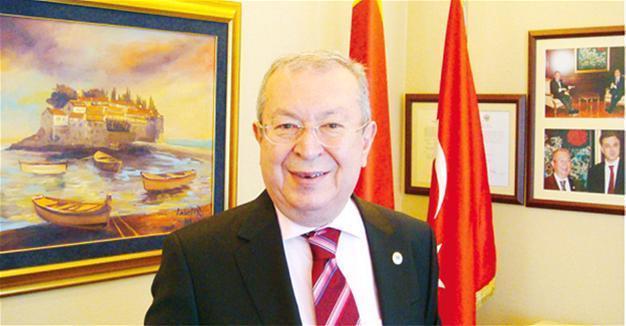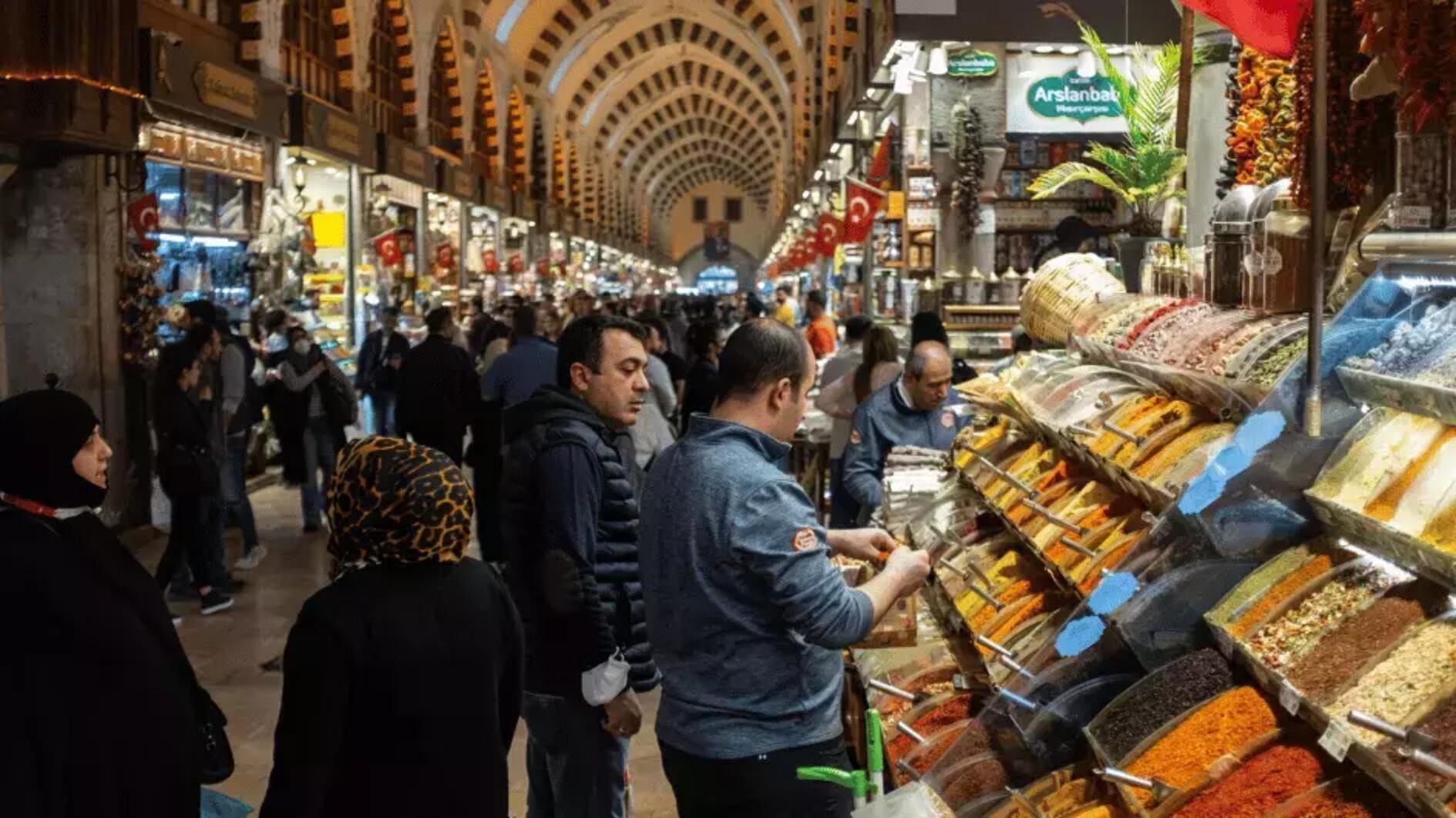Ideas meet where the continents meet
 Dr. Akkan Suver, the president of the Marmara Group Foundation, which organizes the 20th Eurasian Economic Summit, responds to questions by Hürriyet Daily News on the two decades of the event and this year’s agenda.
Dr. Akkan Suver, the president of the Marmara Group Foundation, which organizes the 20th Eurasian Economic Summit, responds to questions by Hürriyet Daily News on the two decades of the event and this year’s agenda. Primarily, Mr. Suver, could you summarize the past twenty years under the main headlines?
Easier said than done! The Marmara Group Foundation holds the Eurasian Economic Summits for twenty years straight. In twenty years, the Eurasian Economic Summits have worked with four presidents, six prime ministers.
Also in twenty years, the Eurasian Economic Summits of the Marmara Group Foundation, which have welcomed actual and former presidents from Macedonia, Turkish Republic of the Northern Cyprus, Romania, Montenegro, Bulgaria, Albania, Bosnia-Herzegovina, Moldova, Croatia, Slovakia, Slovenia, Latvia, Czech Republic, Mongolia, Kyrgyzstan, Kosovo, Estonia for twenty years, are also recognized in the world as a gathering of prestige.
Businessmen also show great interest in the Eurasian Economic Summits which are focal points of the academic world besides the statesmen.
Religious functionaries are essentials for the Eurasian Economic Summits as well.
In other respects, the Eurasian Economic Summits are the raison d’être since the establishment of the Marmara Group Foundation. These works aim to actualize Atatürk’s sharing, esteemed thoughts that aim reaching peace, stability, and prosperity in Caucasus, Central Asia, Middle East and Balkan politics together, collaborating with the differences.
In the meantime, I take it as my duty to commemorate with respect Haydar Aliyev, President of Azerbaijan (1993-2003), Zhelyu Zhelev, President of Bulgaria (1990-1997) and Süleyman Demirel, President of Turkey (1993-2000) in our 20th year as an act of fidelity. Haydar Aliyev, Zhelyu Zhelev and Süleyman Demirel have an exceptional place in the Marmara Group Foundation and the Eurasian Economic Summits. The Marmara Group Foundation is grateful to these three statesmen.
Today, The Marmara Group Foundation and the Eurasian Economic Summits are a contemporary collaboration of thought which internalized distinctness, which is recognized in the world as an international civil initiative.
Among the statesmen, whom else would you want to add?
Azerbaijan, Afghanistan, Bosnia-Herzegovina, Morocco, Montenegro, Kosovo, Romania, Moldova will be participating with a ministerial level and Valeh Aleskerov, Deputy Speaker of Parliament of Azerbaijan are among the who will grace the Summit with their participation.
Meanwhile, Dalia Itzik, Former Chairman of Parliament of Israel, Victor Ponta, Former Prime Minister of Romania, Alenka Bratusek, Former Prime Minister of Slovenia, Taher Al-Masri, Former Prime Minister of Jordan will be among us.
Are there any internationally accepted distinguished thought leaders participating in the 20th Eurasian Economic Summit?
Of course there are!
Dr. Edward De Bono, who is a writer renowned worldwide as the mastermind of famous creative thinking techniques and parallel thinking is among the guests of honor of our Summit this year.
Nassir Abdulaziz Al-Nasser, UN-High Representative for the Alliance of Civilizations will be among us. Nassir Abdulaziz Al-Nasser is a universally acknowledged man of dialogue and peace.
Dr. Erhard Busek, Former Chancellor of Austria will also be among us. Dr. Erhard Busek is a statesman who devoted himself to the development, peace of the Balkans.
You will be addressing the subject of migration with terrorism. How would you like to summarize your examination of terrorism with migration?
Forced migration is the present-day issue. In my opinion, terrorism is fed by forced migration, for the migrating person will pose a problem in the country that refugee arrives as long as he/she is unqualified and uncertified.
Migration is an inseparable part of our globalizing world which is connected through different dynamics.
Today more than 60 million people are migrated under compulsion. While some of them made their escapes as a result of war or terrorism, some others are born in the migrated place and have no choice but become a refugee.
On the other hand, currently, according to the International Labour Organization, 30 million of the 60 million migrated people in the world are slaves. Slavery is the result of the forced migration. These are the people who are employed in harsh conditions and given money enough for only living. These are the sceneries that are ill-suited to our century.
The migration crisis occurring with the refugee influxes showing a dramatic increase in Turkey, Lebanon and Jordan besides Europe and the unsettled public order becoming more serious with the heinous terror attacks that took place in Ankara, Istanbul, Paris, Nice, Orlando, London and Baghdad simultaneously pose problems that are different from each other and difficult to solve. Therefore, we will also bring this issue up for discussion in the 20th Eurasian Economic Summit.
You will have a session about this terror issue under the title of ““Contributions of the Religions to Peace in Order to Overcome the Environment of Violence and Terror and the Association between Migration and Terrorism”. What would you like to say about it?
It is wrong to associate the terrorist incidents, the inhumane activities happening around the world with Islam. It is not appropriate and true. It is unfair to Islam. In the morning session of the second day of the 20th Eurasian Economic Summit, we will work with the aim of fixation of this falsity. We will also request from other religious functionaries to address the contributions in terms of their religion. Especially this year, we will emphasize the falsity of association Islam with terrorism based upon the importance of the idea of Islamic Solidarity which was set forth by İlham Aliyev, President of Azerbaijan.
You will address the EU issue! We know the things that they are going through inside the EU and that they are trying to keep Turkey out of the EU. How would you like to assess the EU issue?
We consider the EU as a project of wealth and peace. While the EU was being established, Statesmen like Monnet, Schubert aimed that there would not be any wars anymore in Europe.
For this, the aim was to trivializing the borders, softening the attempts of movements of nationalism movements that cause war and preventing dissolution of Europe with a war again. Today, in present-day Europe; we have to question whether they will drag the Continental Europe and the World into a Third World War with a Europe that is under threat of dissolution with the increasing movements of nationalism and a policy of the nation-states that is being pursued by emphasizing enemy perceptions by way of borders, land based sovereignty, ethnic and religious identities.
After the success of Donald J. Trump in the elections, the performances that Marine Le Pen in France, Geert Wilders in the Netherlands, the parties such as the Alternative for Germany Party in Germany or the Freedom Party in Austria will show are followed with concern. Will the liberal democracy compatible with constitutional state, social justice and equality, freedoms and human rights and free trade compatible with liberal market economy survive in the future?
As a matter of fact, a new phase for the EU has begun.
In the meantime, if I need to make an economic review regarding the EU, while the Chinese economy is the economy that has increased its share in the fastest way in the world trade, Euro zone is the economy that has lost its share the most.
On the other hand, decrease in China’s growth seems to continue to pose a threat for Europe as well.
With a broader aspect, the economies which seem to be growing cannot grow up to their rate of growth. Thus, the growth rates occurring in various regions of Europe are not enough to decrease the unemployment.
In other respects, where will a union without the United Kingdom in it will lead the Europe to? Will there be other splits from the union? Will the organizational structure of the EU change? We will try to find the answers of all of these questions with the politicians, academicians and civil society pioneers from different countries at the “Challenges That European Union Faces with and Its Future Concerns” session of the 20th Eurasian Economic Summit.
We know that you, as the Marmara Group Foundation, value the Silk Road project very much. What would you like to say about this?
As you have indicated, we, as the Marmara Group Foundation, value the land and sea aspect of the Silk Road very much.
We have addressed the Silk Road on the land and sea in the Eurasian Economic Summits for three years. We will be following this subject this year as well.
I believe that we are responsible for making a progress Silk Road on the sea besides the progress we have made and the stage we have come to in the land. It would appear that for now our Chinese friends have reached an agreement with the Piraeus Port of Greece and work with the relevant port.
We, as Turkey, are responsible for reminding the Aegean Sea to our Chinese friends.
We place great importance on having our country, which is in the land aspect of China’s “One Belt, One Road” project that will bring 65 countries of which the total economies are worth 21 trillion dollars together in commercial, industrial, socio-cultural areas, in the sea aspect as well.
China chose the Piraeus Port of Greece in Europe in 2009. China bought a big part of the port as well.
The world’s giants, Hewlett Packard and Sony in particular, enter the European markers with the containers that are carried via this port.
The fact that China chose the Piraeus Port as the main center in the Silk Road in Europe will not be enough if it is not supported by the Turkish ports in the future. Turkey must be insistent on having our Chinese friends accept the advantages of the Aegean Sea by reminding diligently and carefully China the strategic importance of our country.
As the distinctive individuals of the 20th Eurasian Economic Summit, about whom would you like to mention?
Israel, after many years, will be participating with Dalia Itzik, Former Chairman of Parliament of Israel.
As you are aware of, our relationship with Austria is not actually on a level we would like it to be. However, Heinz Fischer, President of Austria (2004-2016) will be among us. Dr. Erhard Busek, Former Chancellor of Austria will be among us.
On the other hand, I assure you that Prof. Dr. Ali Hasanov, who is among our friends that will come from Azerbaijan, is an acknowledged person on strategy.
To express in a broader view, each participant is of a great value in their own field.
Bringing them together, talking to them, listening their remarks are an opportunity. I consider that being with them during our two-day meetings as making a doctorate thesis, for all of the participants are a symbol of different thought. Therefore, Eurasian Economic Summits are an intellectual platform. They are a ground for contemporary thought.
Will there be any foreign entities in the Summit?
European Parliament, United Nations, Islamic Educational, Scientific and Cultural Organization, Vienna Economic Forum, Academy of Sciences of Moldova, Bulgaria’s Slavyani Foundation, Life Learning Academia of Slovenia are among the organizations from which high level participations are confirmed.
















